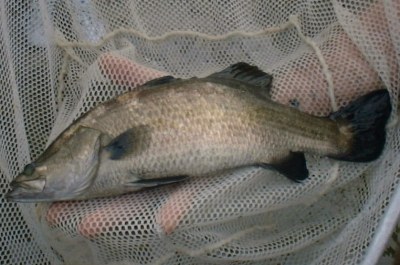 If I ever think I'm having a bad day at work, I will think of this story. Four workers in Turners Falls, Massachusetts fell into a 18-foot filtration tank filled with a mixture of sandy fish feces. The workers were standing on a pad, attached to the tank by a bracket, when the bracket broke, plunging them into the vat of fish waste. The men were rescued, treated and expected to be fine.
If I ever think I'm having a bad day at work, I will think of this story. Four workers in Turners Falls, Massachusetts fell into a 18-foot filtration tank filled with a mixture of sandy fish feces. The workers were standing on a pad, attached to the tank by a bracket, when the bracket broke, plunging them into the vat of fish waste. The men were rescued, treated and expected to be fine.Turners Falls Fire Capt. David Dion comments, "It was very slimy and it was heavy," he said. "Never seen anything like it in my life."
The Australis Aquaculture fish farm in Turners Falls farms barramundi, a replacement for grouper. While we're on the topic, did you ever think of where your fish comes from? There are two types, wild and farm-raised. While fishing fish in the wild can quickly destroy ecosystems (think Happy Feet), farm-raised fish can cause similar havoc.
According to a 2002 article in Time Magazine, aquaculture (as opposed to agriculture) is already the world's fastest-growing food industry, with production increasing more than 10% a year. This is good because "about half the world's wild fisheries have been exhausted by overfishing. In the North Atlantic, one of the most depleted oceans, populations of popular fish are just one-sixth of what they were a century ago." Theoretically, when you eat farm-raised fish, you are saving a wild fish from being removed from the wild.
In fact, ecologists and economists warn that, at the current rate without any changes, the world will run out of seafood by 2048. According to the Washington Post, "the journal Science, concludes that overfishing, pollution and other environmental factors are wiping out important species around the globe, hampering the ocean's ability to produce seafood, filter nutrients and resist the spread of disease."
However, there are many critics of fish farming. According to that same Time article, Otto Langer, a biologist who worked 30 years for Canada's Department of Fisheries, says "a large salmon farm may pour as much liquid waste into the sea as a small city." Not only can fish farms contribute to polluting the waters, but they deplete the supply of wild fish in order to feed their farm-raised counterparts. This leads to some pretty unnatural stuff.
Because salmon are voracious eaters of smaller species, it takes several pounds of wild fish, ground up into meal, to yield 1 lb. of farmed salmon — an exchange that depletes the world supply of protein. The diet of farmed salmon lacks the small, pink-colored krill that their wild cousins eat, so the flesh of farmed fish is gray; a synthetic version of astaxanthin, a naturally occurring pigment, is added to the feed.Also consider the effects of disease, parasites, severe overcrowding of fish, and the antibiotics (farmers give to protect their fish) leaking into the waters.. Also there are potential problems when farm-raised fish escape into the wild, interfering with the natural ecological balance of the area.
Shrimp are particularly damaging to the environment. Shrimp farms can actually raise the salinity of surrounding waters, and the waste run off can kill trees in area. Interestingly enough, Time has some praise for particular invertebrate farms.
On an eco-friendly scale, bivalves generally rate highest among the more than 220 species of fish and shellfish that are cultivated commercially. Mussels and oysters are filter-feeders that make the surrounding water cleaner, so small-scale farming of them is not usually harmful to the ecosystem.
No comments:
Post a Comment